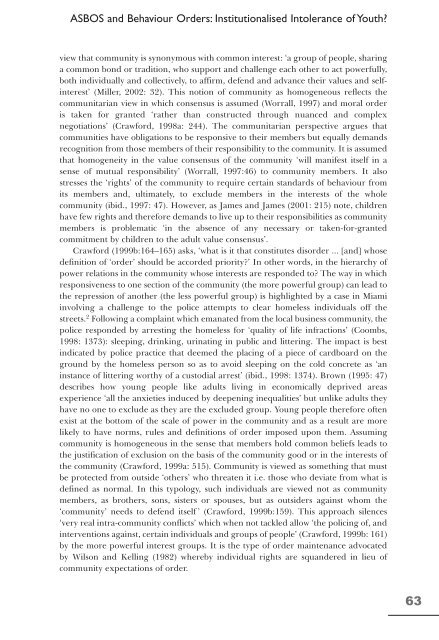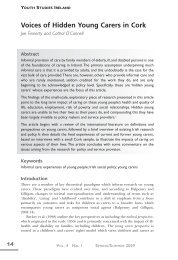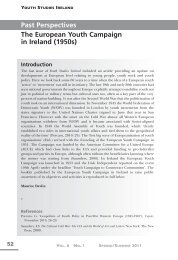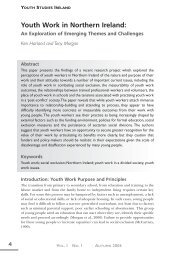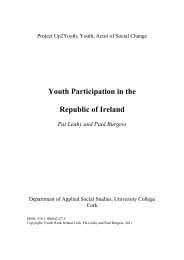Download full edition - Youth Work Ireland
Download full edition - Youth Work Ireland
Download full edition - Youth Work Ireland
Create successful ePaper yourself
Turn your PDF publications into a flip-book with our unique Google optimized e-Paper software.
ASBOS and Behaviour Orders: Institutionalised Intolerance of <strong>Youth</strong>?view that community is synonymous with common interest: ‘a group of people, sharinga common bond or tradition, who support and challenge each other to act power<strong>full</strong>y,both individually and collectively, to affirm, defend and advance their values and selfinterest’(Miller, 2002: 32). This notion of community as homogeneous reflects thecommunitarian view in which consensus is assumed (Worrall, 1997) and moral orderis taken for granted ‘rather than constructed through nuanced and complexnegotiations’ (Crawford, 1998a: 244). The communitarian perspective argues thatcommunities have obligations to be responsive to their members but equally demandsrecognition from those members of their responsibility to the community. It is assumedthat homogeneity in the value consensus of the community ‘will manifest itself in asense of mutual responsibility’ (Worrall, 1997:46) to community members. It alsostresses the ‘rights’ of the community to require certain standards of behaviour fromits members and, ultimately, to exclude members in the interests of the wholecommunity (ibid., 1997: 47). However, as James and James (2001: 215) note, childrenhave few rights and therefore demands to live up to their responsibilities as communitymembers is problematic ‘in the absence of any necessary or taken-for-grantedcommitment by children to the adult value consensus’.Crawford (1999b:164–165) asks, ‘what is it that constitutes disorder ... [and] whosedefinition of ‘order’ should be accorded priority?’ In other words, in the hierarchy ofpower relations in the community whose interests are responded to? The way in whichresponsiveness to one section of the community (the more powerful group) can lead tothe repression of another (the less powerful group) is highlighted by a case in Miamiinvolving a challenge to the police attempts to clear homeless individuals off thestreets. 2 Following a complaint which emanated from the local business community, thepolice responded by arresting the homeless for ‘quality of life infractions’ (Coombs,1998: 1373): sleeping, drinking, urinating in public and littering. The impact is bestindicated by police practice that deemed the placing of a piece of cardboard on theground by the homeless person so as to avoid sleeping on the cold concrete as ‘aninstance of littering worthy of a custodial arrest’ (ibid., 1998: 1374). Brown (1995: 47)describes how young people like adults living in economically deprived areasexperience ‘all the anxieties induced by deepening inequalities’ but unlike adults theyhave no one to exclude as they are the excluded group. Young people therefore oftenexist at the bottom of the scale of power in the community and as a result are morelikely to have norms, rules and definitions of order imposed upon them. Assumingcommunity is homogeneous in the sense that members hold common beliefs leads tothe justification of exclusion on the basis of the community good or in the interests ofthe community (Crawford, 1999a: 515). Community is viewed as something that mustbe protected from outside ‘others’ who threaten it i.e. those who deviate from what isdefined as normal. In this typology, such individuals are viewed not as communitymembers, as brothers, sons, sisters or spouses, but as outsiders against whom the‘community’ needs to defend itself ’ (Crawford, 1999b:159). This approach silences‘very real intra-community conflicts’ which when not tackled allow ‘the policing of, andinterventions against, certain individuals and groups of people’ (Crawford, 1999b: 161)by the more powerful interest groups. It is the type of order maintenance advocatedby Wilson and Kelling (1982) whereby individual rights are squandered in lieu ofcommunity expectations of order.63


